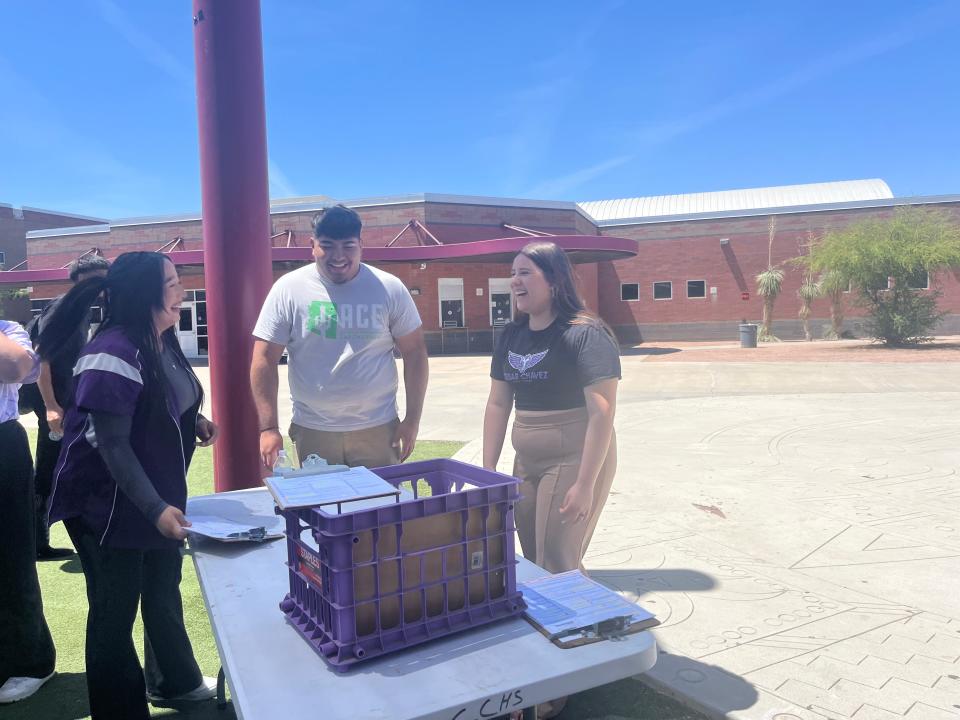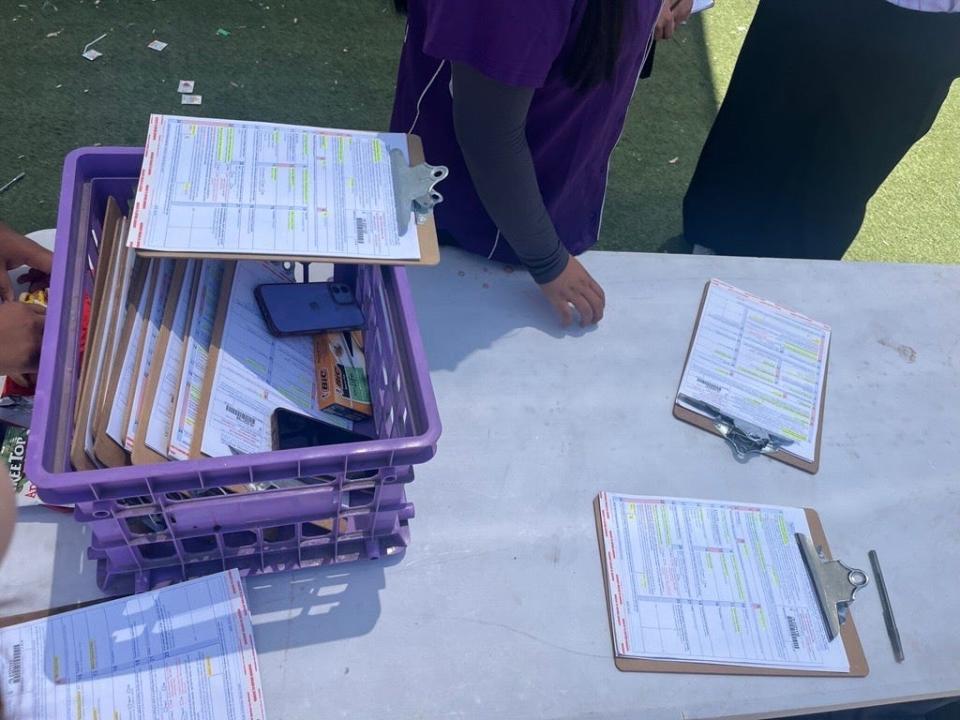South Phoenix students work to register peers to vote, but face challenges
At one high school in south Phoenix, Mexican American student group members are trying to register classmates who will be newly eligible to vote in November, when Arizona's large population of young Latinos could influence race outcomes.
Though the students leading the effort believe that voting is worthwhile, they said convincing some classmates has been a challenge.
Students in Cesar Chavez High School's M.E.Ch.A organization — short for Movimiento Estudiantil Chicano de Aztlán — began a nonpartisan effort to register eligible classmates a week ago. They received training from the Arizona Center for Empowerment, and within three school days, they'd registered nearly 70 classmates. Much of the work took place during lunchtimes.
About 73% of the students at Cesar Chavez are Hispanic, according to Arizona Department of Education data, and there are about 500 students who will be newly eligible to vote in the November elections, according to Ann Acosta, a community liaison for the school.
They're part of a population that has the potential to be influential in the 2024 elections. About 163,000 Latino youth in Arizona are expected to turn 18 before the November election, according to María Teresa Kumar, the CEO of Voto Latino.
Latino youth make up about 40% of people in the western U.S., including Arizona, who will be newly eligible to vote in a presidential election in November, according to the Center for Information and Research on Civic Learning and Engagement at Tufts University.
Roughly a quarter of eligible voters in Arizona are Latino, according to the Pew Research Center. Across the country, Latino eligible voters tend to be younger than eligible voters overall — 31% of eligible Latino voters are between 18 and 29, compared to 20% of all U.S. adults in that age group, according to Pew.
Ismael Luna, 18, said he was surprised that many of his classmates were already registered to vote. But there was also a "huge number" of eligible classmates who weren't, he said. "I feel like if it wasn't for ACE being here and us tabling, they wouldn't have registered, this year at least," said the Cesar Chavez High School M.E.Ch.A co-president.
The Phoenix Union High School District typically hosts events to help register newly eligible students on National Voter Registration Day in September, according to Acosta, who has helped organize that effort at Cesar Chavez for the past five years. But "nothing to this scale," she said. It's the first time M.E.Ch.A is leading the efforts on campus.

Brianna Lomas, 18, M.E.Ch.A co-president, and Jocelyn Montiel, 16, the group's treasurer, both said that abortion has been a common issue that their classmates said they care about. But this hasn't necessarily translated to their classmates wanting to vote, the student group leaders said.
Montiel, who will still be too young to vote in November, said she believes voting is an important way to express opinions. She said a visit to the state Capitol especially influenced her.
"I saw everything that was going on, how stuff was being voted for, and I was like, 'Yeah, some things have to change. ... When I am able to vote, maybe I should vote,'" Montiel said.
But many of Montiel's peers don't seem to see voting as a way to get their voices heard, she said. She's heard classmates express views on specific issues or laws, and "they have the option to vote, but they choose not to," she said.
Montiel also said some students just don't want to put in the effort required to register and vote.
"Nobody wants to be filling out a form," she said. "I get that." Some of her classmates have said that registering and then voting in November "seems like a lot of work."
But she said informing some of her classmates they can vote from home by mail has made it more appealing. "They were like, 'Oh, at home, in my PJs? Oh, OK,'" Montiel said.
Luna said that talking to classmates about registering to vote has encouraged them to consider what issues they should care about. "They actually start wondering, since they're registering to vote, 'Oh, what am I voting for?'" he said. "It actually opens the topic. … 'What issues are there?' Otherwise, I feel like they wouldn't have asked."

Teacher Vanessa Sanchez, one of M.E.Ch.A's staff sponsors, said that some students seem disinclined to register.
"A lot of things we were running into was just, 'I don't want to vote. ... I don't want to even register. It's not on my priority list right now," she said. "When we try to get to the bottom of it, I think, as adults, we see a lot of our students disheartened by what's going on."
Even so, Luna said many of his friends have said they plan to vote in November, but the conversation is always about the presidential election.
"I don't think anyone really talks about the local level. ... At least not that I've heard of," Luna said.
Though the population of Latino youth who are eligible to vote is fast-growing, young Latinos have also historically had low turnout rates compared to other groups. During the 2022 midterm elections, the voter turnout rate of Latinos between 18 to 29 in the western U.S. was 15%, compared to 35% of white youth, 17% of Black youth and 22% of Asian youth, according to CIRCLE at Tufts. Across the country, the youngest voters, those who are 18 and 19, had lower voter turnout than those aged 20-29.
Sanchez, the M.E.Ch.A sponsor, said she wants to ensure students in south Phoenix have access to resources that allow them to be civically engaged. "Too often, things like this don't come to our campuses," she said. "We want to ensure that just because we're in a specific ZIP code or community doesn't mean that your voice can't be shared."
Montiel said she thinks there's "a lot that we can do for our community to grow stronger in the future."
"Being ... of Hispanic heritage, I feel like it's important to vote because there's changes that can be made ... for us to help better the community," she said.
Reach the reporter at mparrish@arizonarepublic.com.
This article originally appeared on Arizona Republic: Phoenix students work to register peers to vote, but face challenges

